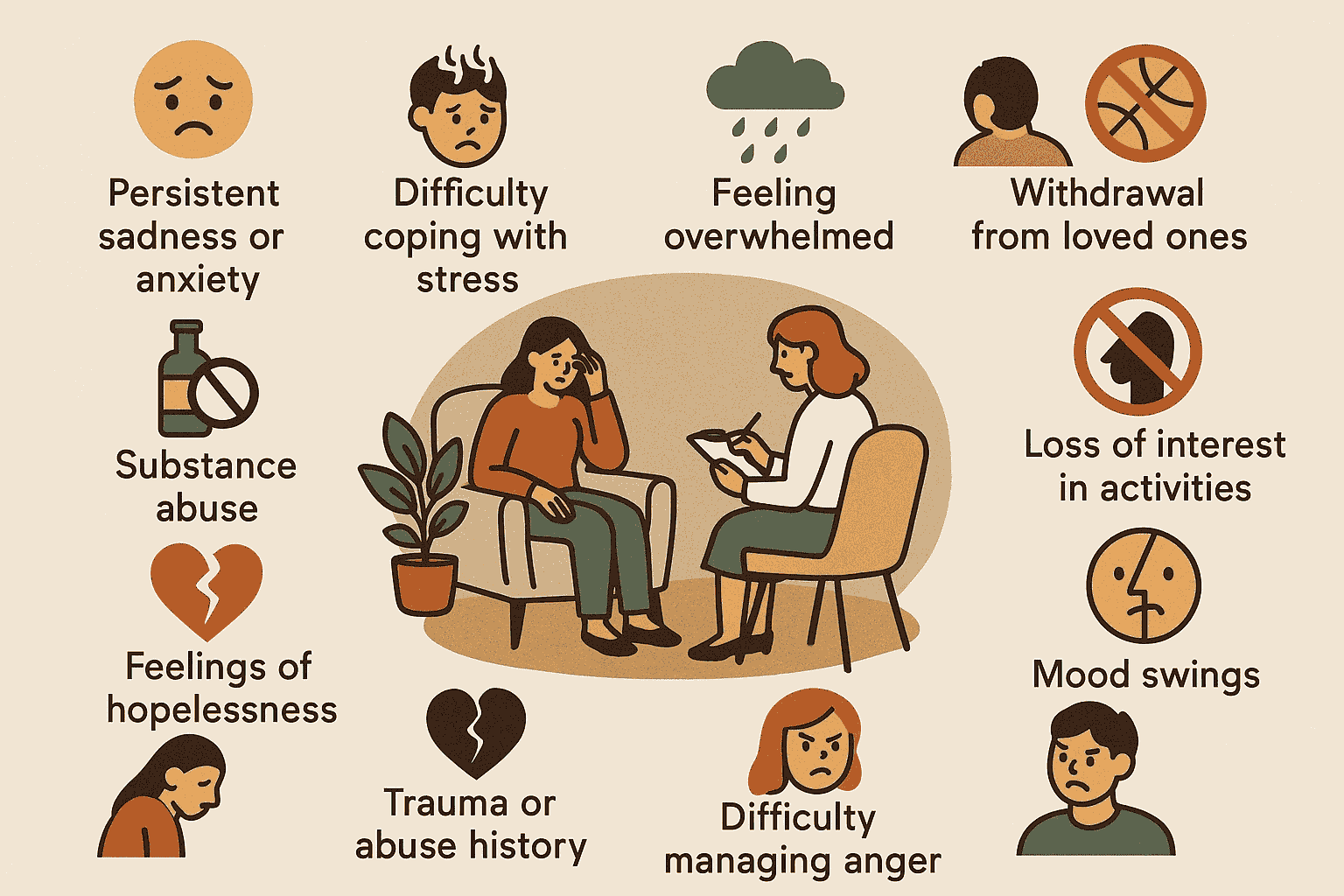Discovering the Benefits of Mental Therapy for Adolescent Health and Growth
Psychological therapy plays a critical function in the health and development of teenagers. Adolescence is a troubled duration noted by psychological and social obstacles. Therapy offers a structured atmosphere for teenagers to express their sensations and challenge their battles. It equips them with important tools for durability and communication. As they browse this developing phase, the influence of treatment can be extensive. What details advantages can arise from such assistance throughout these developmental years?

Recognizing the Adolescent Mind: Pressures and difficulties
As teenagers browse the intricacies of their developing phase, they deal with countless obstacles and stress that can greatly impact their mental health. This period is marked by significant physical, emotional, and social changes, which can induce feelings of confusion and uncertainty. Peer influence heightens, commonly bring about a battle for approval and identity. Academic assumptions can develop extra anxiety, as the pressure to excel mounts in a significantly affordable atmosphere.
Additionally, the introduction of social media introduces a brand-new layer of complexity, where comparisons to curated online personas can aggravate sensations of inadequacy and anxiousness. These variables can cause psychological distress, consisting of anxiety, clinical depression, and low self-esteem. Recognizing these difficulties is essential for moms and dads, teachers, and psychological health and wellness professionals, as it supplies insight right into the adolescent experience and highlights the demand for supportive treatments to foster strength and well-being throughout this crucial developing phase.
Developing a Safe Space for Expression
Developing a safe area for expression is important for teens maneuvering their troubled developing stage. In healing settings, this atmosphere cultivates open dialogue, enabling teenagers to communicate their sensations without fear of judgment. Such areas allow them to explore their emotions and thoughts, which is important for recognizing their identifications and experiences.
When teens really feel safe, they are much more most likely to share their battles, consisting of stress and anxiety, anxiety, or interpersonal conflicts. This open communication can lead to deeper understandings and assist in personal development.
A safe room motivates creative thinking and self-reflection, providing teens the flexibility to express themselves through various electrical outlets, such as art or writing. Developing depend on in between the specialist and the teen is crucial, as it underpins the efficiency of the therapeutic process. Eventually, developing a risk-free room for expression acts as a structure for emotional healing and individual growth throughout these developmental years.
Developing Coping Methods and Resilience

Therapists frequently present techniques such as mindfulness, journaling, and analytic skills, making it possible for teens to manage their responses a lot more efficiently. Furthermore, by involving in role-play situations, they exercise exactly how to handle challenging circumstances, strengthening their confidence. Gradually, these skills foster a sense of agency, furnishing teens with the devices to navigate life's uncertainties. The advancement of durability not only help in conquering prompt challenges however also lays the groundwork for much healthier psychological responses in the adult years, eventually adding to lifelong wellness.
Enhancing Interaction Skills
Reliable interaction skills are necessary for teenagers as they navigate complex social landscapes. Mental treatment plays an essential role in enhancing these abilities, enabling teenagers to express their ideas and feelings extra clearly. Via assisted sessions, specialists urge teenagers to express their feelings, assisting in far better understanding in peer communications and family dynamics.
Treatment provides a safe space for exercising active listening, empathy, and assertiveness. These abilities equip teenagers to participate in meaningful discussions, willpower problems, and construct stronger connections. As they learn to interact successfully, they also gain confidence in their capability to promote for themselves and their needs.
Additionally, improved interaction skills contribute to emotional intelligence, enabling teens to acknowledge and respond to the emotions of others. This alternative development promotes an encouraging atmosphere, ultimately promoting total wellness and social integration. Through mental therapy, teenagers can grow these necessary abilities for a healthier social experience.
Fostering Personal Development and Self-Discovery
Fostering personal development and self-discovery in young adults includes a diverse strategy that encourages understanding of individual identity. This process additionally highlights the importance of structure resilience skills and boosting emotional recognition. Together, these components create a structure check here for much healthier, much more confident individuals as they navigate their developmental years.
Understanding Individuality
Exactly how do teens browse the facility landscape of individuality as they endeavor for self-discovery and development? During this developmental period, they come to grips with different influences, including peers, household, and social expectations. Mental therapy can function as a crucial tool, giving a secure area for exploration and representation. With led discussions, teens can articulate their thoughts and feelings, allowing them to understand their ideas, worths, and desires. This procedure promotes a deeper awareness of their special identity, equipping them to make enlightened options and develop a sense of purpose. As they engage in self-discovery, they discover to accept their uniqueness and browse obstacles with better clarity, inevitably enhancing their general health and personal growth.
Structure Strength Skills

Enhancing Psychological Understanding
Enhancing emotional awareness is crucial for teenagers steering the intricacies of adolescence, as it allows them to identify and recognize their sensations better. By participating in psychological treatment, adolescents learn to identify their emotional responses and the triggers behind them. This procedure promotes personal development and self-discovery, allowing them to articulate here their feelings and deal with challenges extra expertly. As teens create psychological awareness, they grow empathy, boost connections, and enhance interaction skills. Additionally, this increased awareness help in decision-making, assisting them browse public opinions and develop a feeling of identity. Inevitably, fostering psychological awareness via therapy can bring about healthier coping devices and a much more well balanced emotional state, basic for flourishing throughout these formative years.
Structure Healthy And Balanced Relationships and Support Equipments
While passing through the intricacies of adolescence, developing healthy connections and assistance systems is vital for young adults. These connections supply psychological stability and a feeling of belonging, critical during this developing phase. Positive connections with peers, family members, and mentors can improve self-worth and resilience, allowing young adults to browse challenges a lot more effectively.
Mental treatment plays a crucial role in fostering these connections by outfitting adolescents with communication and conflict-resolution skills. With treatment, they find out to share their sensations, understand different point of views, and establish limits, which are basic for maintaining healthy and balanced communications.
Helpful networks urge teens to seek aid when needed, minimizing seclusion and advertising psychological wellness. When teenagers feel linked to their assistance systems, they are more probable to involve in useful habits and make notified decisions. On the whole, the farming of healthy relationships and support group contributes in advertising teen well-being and personal development
Frequently Asked Inquiries
Exactly how Do I Find a Professional Therapist for My Young adult?
To discover a qualified specialist for a teenager, one must seek get redirected here referrals from healthcare providers, research study qualifications on the internet, examine evaluations, and identify the therapist concentrates on adolescent concerns, fostering a helpful setting for growth.
What Are the Prices Connected With Mental Treatment for Teens?
The expenses linked with mental therapy for teenagers differ widely, normally ranging from $50 to $250 per session. Insurance protection, gliding scale fees, and regional sources can influence affordability and access for families seeking support.
Just How Often Should Teenagers Go To Therapy Procedure?
Young adults should ideally go to therapy sessions regular or biweekly, relying on specific needs. Consistent sessions can promote a risk-free area for expression, while permitting specialists to check progress and adjust techniques successfully gradually.
Can Treatment Be Reliable for All Teenagers?
Treatment can be reliable for several teenagers, yet specific outcomes differ. Variables such as individual conditions, visibility to the procedure, and the healing technique used all affect its efficiency for every teen.
What Should Parents Do During Their Teenager's Treatment Refine?
Moms and dads must actively support their teenager's treatment procedure by preserving open communication, respecting confidentiality, attending sessions if welcomed, and motivating their kid's efforts (Individual Therapy Toronto). Comprehending and patience are important as teenagers browse their personal growth trip
Mental therapy plays a crucial function in the wellness and growth of young adults. By engaging in psychological treatment, adolescents find out to identify their emotional responses and the triggers behind them. Psychological therapy plays a crucial function in fostering these partnerships by furnishing adolescents with interaction and conflict-resolution skills. Young adults must ideally participate in therapy sessions once a week or biweekly, depending on private demands. Parents should proactively support their young adult's therapy process by keeping open communication, valuing privacy, attending sessions if welcomed, and encouraging their kid's efforts.